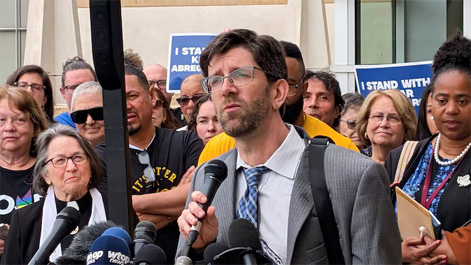|
|
|
|
|
|
 |
|
|
Attorney
Simon
Sandoval-Moshenberg
speaks
outside
the U.S.
courthouse,
after a
judge
ruled
that his
client
Kilmar
Abrego
Garcia
must be
returned
to the
U.S.
from El
Salvador,
in
Greenbelt,
Maryland,
U.S.,
April 4,
2025.
REUTERS/Mike
Scarcella/File
Photo |
| |
Significant
legal,
ethical,
and
political
issues
surround
immigration
and
deportation
in the
U.S.
Patricia
Romero -
International
Tell Us
USA News
Network
WASHINGTON
- Kilmar
Abrego
Garcia,
a
Salvadoran
migrant
who
legally
lived in
Maryland
with a
work
permit,
was
deported
to El
Salvador
in March
2025.
The
deportation
occurred
despite
a 2019
court
order
granting
him
protection
from
removal
due to
the risk
of gang
persecution
in his
home
country.
His
deportation
has
prompted
extensive
litigation,
with his
lawyers
challenging
its
legality
and
calling
it
"wholly
lawless."
They
assert
there is
no
evidence
supporting
the
government's
contention
that his
return
to the
U.S. is
impossible,
and they
deny
allegations
that he
is
affiliated
with the
gang
MS-13.
The U.S.
Supreme
Court
has
temporarily
paused a
lower
court's
order
requiring
his
return
by the
end of
the day
on
Monday,
providing
additional
time for
the
justices
to
review
the
administration's
formal
request
to block
the
judge's
ruling.
Earlier
that
day, the
4th U.S.
Circuit
Court of
Appeals
had
denied
the
administration's
attempt
to
freeze
the
judge's
decision.
The
Justice
Department
contends
that
while
deporting
Abrego
Garcia
to El
Salvador
was an
"administrative
error,"
his
actual
removal
from the
U.S. was
lawful,
arguing
that his
alleged
gang
affiliation
makes
him
ineligible
for
deportation
protection.
They
have
also
accused
the
judge of
judicial
overreach
and
cited
complications
in
international
negotiations
as
reasons
for
their
inability
to
comply
with her
order.
Abrego
Garcia's
case is
further
complicated
by
personal
circumstances—he
is
married
to an
American
citizen,
raising
a U.S.
citizen
child,
and has
never
been
charged
with or
convicted
of a
crime.
His
deportation
has left
him
detained
in one
of El
Salvador's
most
dangerous
prisons,
where
conditions
are
dire.
This has
sparked
public
outcry
and
heightened
scrutiny
of U.S.
immigration
policies
under
the
Trump
administration,
particularly
regarding
high-profile
deportation
flights
and the
designation
of MS-13
as a
foreign
terrorist
organization.
The
controversy
has also
led to
internal
repercussions
within
the
Justice
Department,
including
the
suspension
of two
officials
involved
in the
case.
The
broader
implications
of this
case
touch on
judicial
authority,
foreign
relations,
and the
treatment
of
migrants
in the
U.S.
legal
system.
It
underscores
the
challenges
of
balancing
national
security
concerns,
individual
rights,
and
international
diplomacy
in
immigration
enforcement.
|
|
|
|
|
|
|
|
|